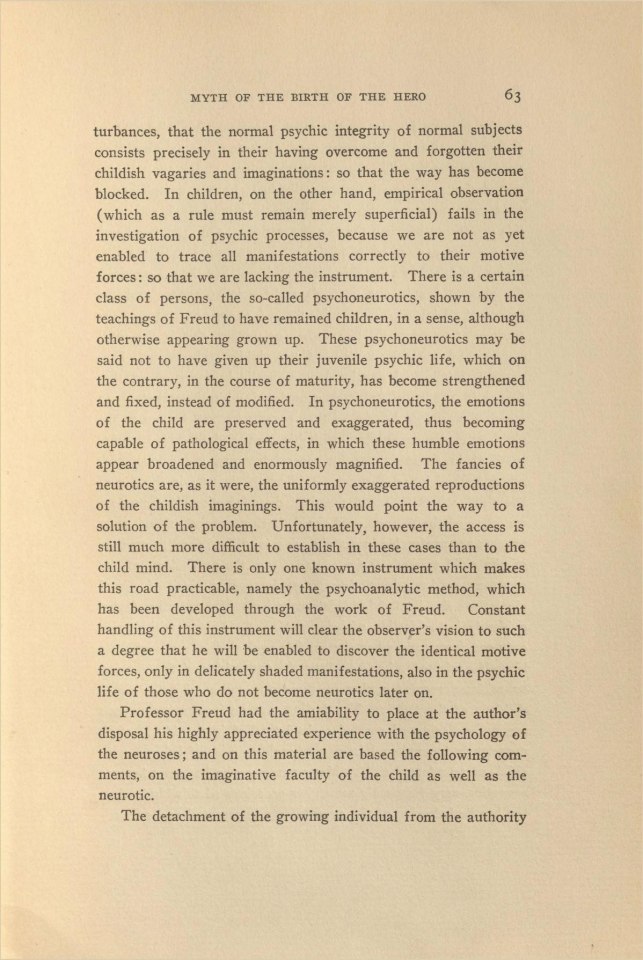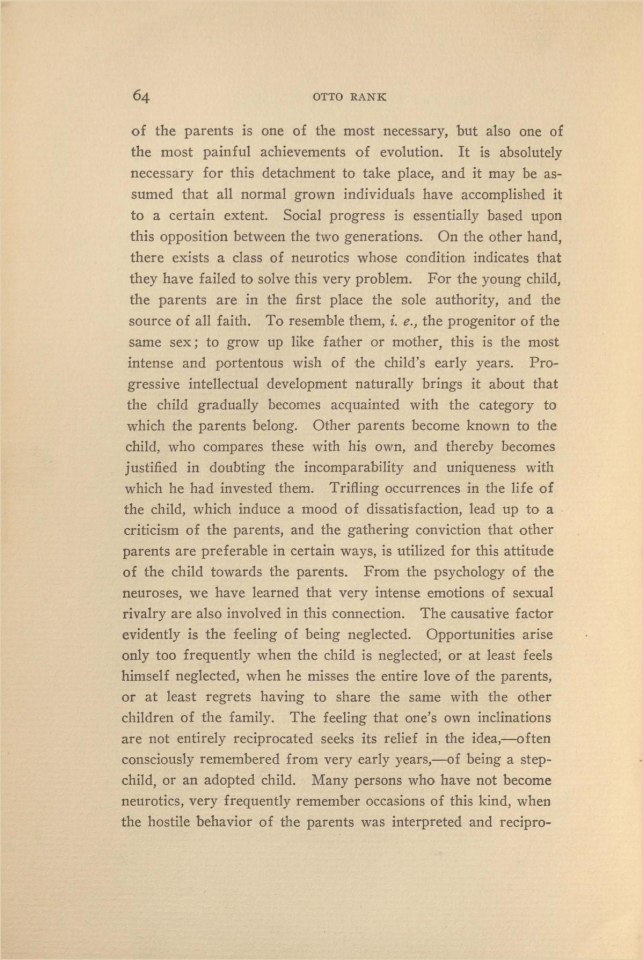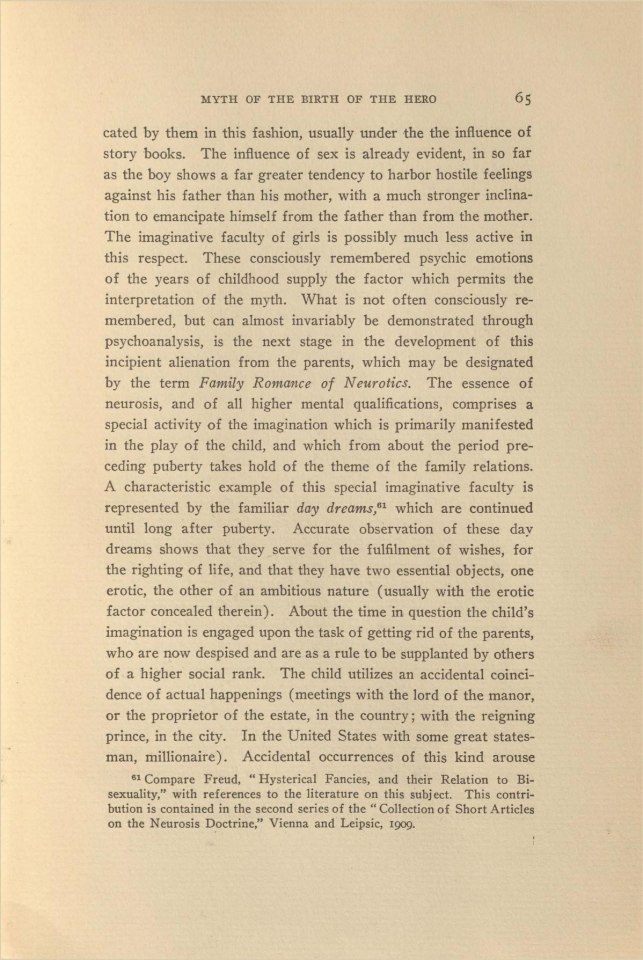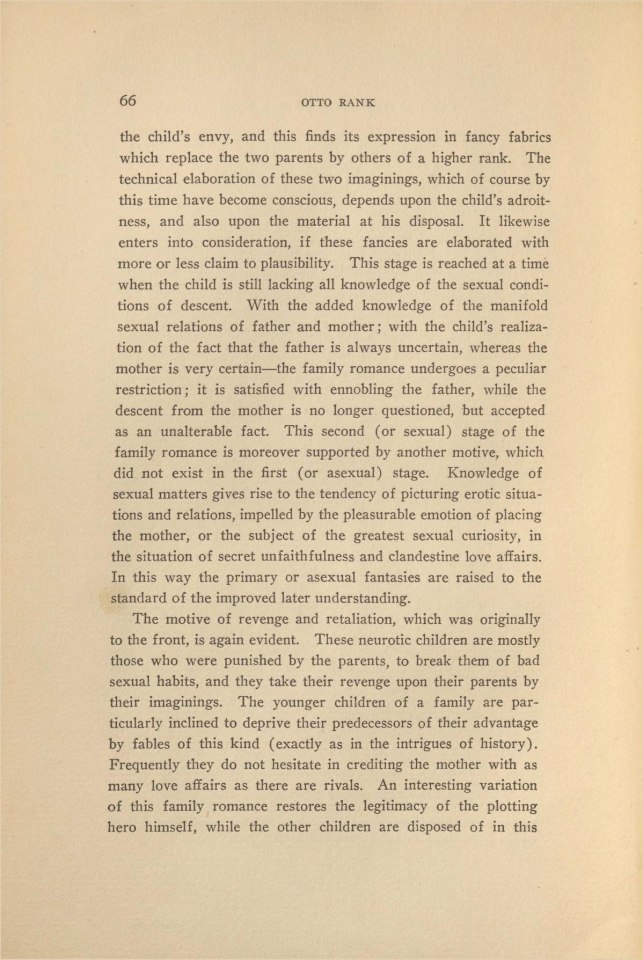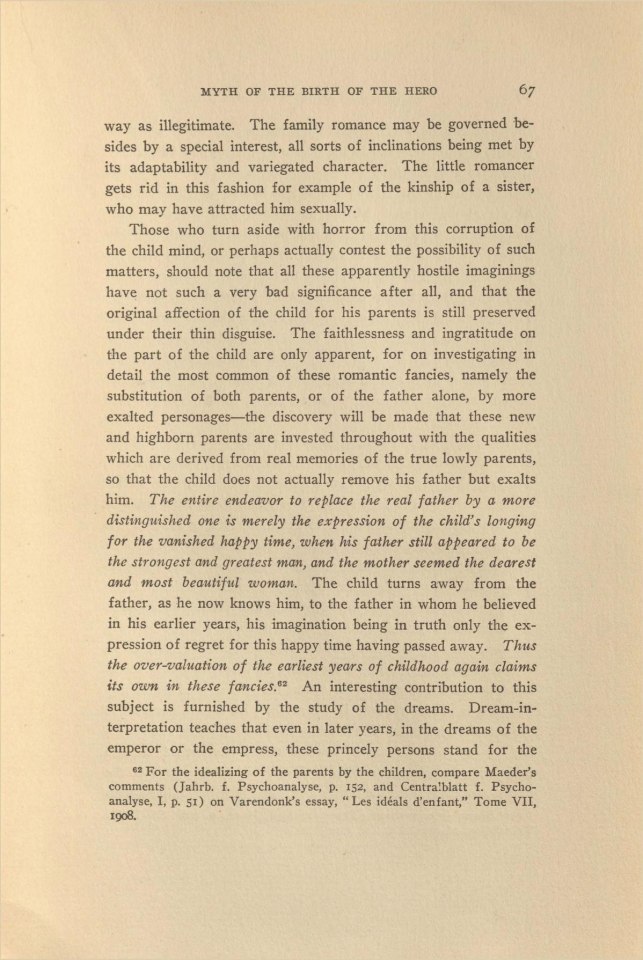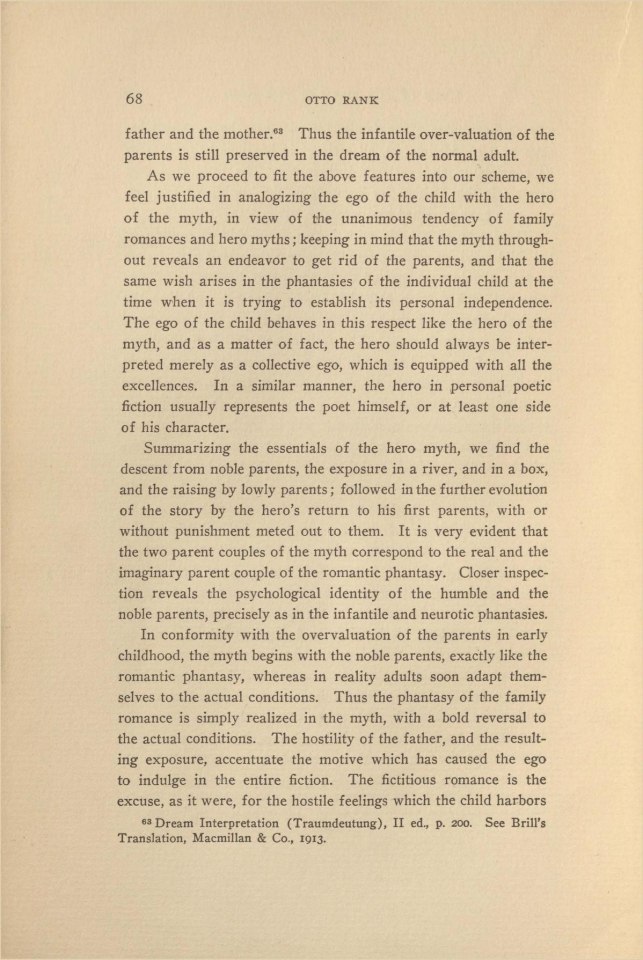S.
S.
OTTO RANK
64
of the parents is one of the most necessary, but also one of
the most painful achievements of evolution. It is absolutely
necessary for this detachment to take place, and it may be as-
sumed that all normal grown individuals have accomplished it
to a certain extent. Social progress is essentially based upon
this opposition between the two generations. On the other hand,
there exists a class of neurotics whose condition indicates that
they have failed to solve this very problem. For the young child,
the parents are in the first place the sole authority, and the
source of all faith. To resemble them, *i. e.*, the progenitor of the
same sex; to grow up like father or mother, this is the most
intense and portentous wish of the child's early years. Pro-
gressive intellectual development naturally brings it about that
the child gradually becomes acquainted with the category to
which the parents belong. Other parents become known to the
child, who compares these with his own, and thereby becomes
justified in doubting the incomparability and uniqueness with
which he had invested them. Trifling occurrences in the life of
the child, which induce a mood of dissatisfaction, lead up to a
criticism of the parents, and the gathering conviction that other
parents are preferable in certain ways, is utilized for this attitude
of the child towards the parents. From the psychology of the
neuroses, we have learned that very intense emotions of sexual
rivalry are also involved in this connection. The causative factor
evidently is the feeling of being neglected. Opportunities arise
only too frequently when the child is neglected, or at least feels
himself neglected, when he misses the entire love of the parents,
or at least regrets having to share the same with the other
children of the family. The feeling that one's own inclinations
are not entirely reciprocated seeks its relief in the idea,—often
consciously remembered from very early years,—of being a step-
child, or an adopted child. Many persons who have not become
neurotics, very frequently remember occasions of this kind, when
the hostile behavior of the parents was interpreted and recipro-
S.
MYTH OF THE BIRTH OF THE HERO65
cated by them in this fashion, usually under the the influence of
story books. The influence of sex is already evident, in so far
as the boy shows a far greater tendency to harbor hostile feelings
against his father than his mother, with a much stronger inclina-
tion to emancipate himself from the father than from the mother.
The imaginative faculty of girls is possibly much less active in
this respect. These consciously remembered psychic emotions
of the years of childhood supply the factor which permits the
interpretation of the myth. What is not often consciously re-
membered, but can almost invariably be demonstrated through
psychoanalysis, is the next stage in the development of this
incipient alienation from the parents, which may be designated
by the term *Family Romance of Neurotics*. The essence of
neurosis, and of all higher mental qualifications, comprises a
special activity of the imagination which is primarily manifested
in the play of the child, and which from about the period pre-
ceding puberty takes hold of the theme of the family relations.
A characteristic example of this special imaginative faculty is
represented by the familiar day dreams,63 which are continued
until long after puberty. Accurate observation of these day
dreams shows that they serve for the fulfilment of wishes, for
the righting of life, and that they have two essential objects, one
erotic, the other of an ambitious nature (usually with the erotic
factor concealed therein). About the time in question the child’s
imagination is engaged upon the task of getting rid of the parents,
who are now despised and are as a rule to be supplanted by others
of a higher social rank. The child utilizes an accidental coinci-
dence of actual happenings (meetings with the lord of the manor,
or the proprietor of the estate, in the country; with the reigning
prince, in the city. In the United States with some great states-
man, millionaire). Accidental occurrences of this kind arouse
63 Compare Freud, "Hysterical Fancies, and their Relation to Bi-
sexuality," with references to the literature on this subject. This contri-
bution is contained in the second series of the "Collection of Short Articles
on the Neurosis Doctrine," Vienna and Leipsic, 1909.S.
66OTTO RANK
the child’s envy, and this finds its expression in fancy fabrics
which replace the two parents by others of a higher rank. The
technical elaboration of these two imaginings, which of course by
this time have become conscious, depends upon the child’s adroit-
ness, and also upon the material at his disposal. It likewise
enters into consideration, if these fancies are elaborated with
more or less claim to plausibility. This stage is reached at a time
when the child is still lacking all knowledge of the sexual condi-
tions of descent. With the added knowledge of the manifold
sexual relations of father and mother; with the child’s realiza-
tion of the fact that the father is always uncertain, whereas the
mother is very certain—the family romance undergoes a peculiar
restriction; it is satisfied with ennobling the father, while the
descent from the mother is no longer questioned, but accepted
as an unalterable fact. This second (or sexual) stage of the
family romance is moreover supported by another motive, which
did not exist in the first (or asexual) stage. Knowledge of
sexual matters gives rise to the tendency of picturing erotic situa-
tions and relations, impelled by the pleasurable emotion of placing
the mother, or the subject of the greatest sexual curiosity, in
the situation of secret unfaithfulness and clandestine love affairs.
In this way the primary or asexual fantasies are raised to the
standard of the improved later understanding.The motive of revenge and retaliation, which was originally
to the front, is again evident. These neurotic children are mostly
those who were punished by the parents, to break them of bad
sexual habits, and they take their revenge upon their parents by
their imaginings. The younger children of a family are par-
ticularly inclined to deprive their predecessors of their advantage
by fables of this kind (exactly as in the intrigues of history).
Frequently they do not hesitate in crediting the mother with as
many love affairs as there are rivals. An interesting variation
of this family romance restores the legitimacy of the plotting
hero himself, while the other children are disposed of in thisS.
MYTH OF THE BIRTH OF THE HERO67
way as illegitimate. The family romance may be governed be-
sides by a special interest, all sorts of inclinations being met by
its adaptability and variegated character. The little romancer
gets rid in this fashion for example of the kinship of a sister,
who may have attracted him sexually.Those who turn aside with horror from this corruption of
the child mind, or perhaps actually contest the possibility of such
matters, should note that all these apparently hostile imaginings
have not such a very bad significance after all, and that the
original affection of the child for his parents is still preserved
under their thin disguise. The faithlessness and ingratitude on
the part of the child are only apparent, for on investigating in
detail the most common of these romantic fancies, namely the
substitution of both parents, or of the father alone, by more
exalted personages—the discovery will be made that these new
and highborn parents are invested throughout with the qualities
which are derived from real memories of the true lowly parents,
so that the child does not actually remove his father but exalts
him. The entire endeavor to replace the real father by a more
distinguished one is merely the expression of the child's longing
for the vanished happy time, when his father still appeared to be
the strongest and greatest man, and the mother seemed the dearest
and most beautiful woman. The child turns away from the
father, as he now knows him, to the father in whom he believed
in his earlier years, his imagination being in truth only the ex-
pression of regret for this happy time having passed away. Thus
the over-valuation of the earliest years of childhood again claims
its own in these fancies.65 An interesting contribution to this
subject is furnished by the study of the dreams. Dream-in-
terpretation teaches that even in later years, in the dreams of the
emperor or the empress, these princely persons stand for the
65 For the idealizing of the parents by the children, compare Maeder’s
comments (Jahrb. f. Psychoanalyse, p. 152, and Zentralblatt f. Psycho-
analyse, I, p. 51) on Varendonk’s essay, “Les Idéals d’enfant,” Tome VII,
1908.S.
rank-1914-hero
- Robbins, F.
- Jelliffe, Smith Ely
63
–68
